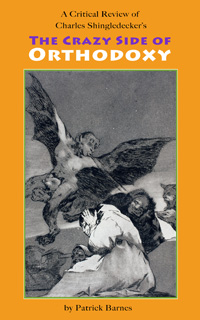A Review of The Crazy Side of Orthodoxy
Author: Charles Shingledecker. Publisher: Regina Orthodox Press, 2011.
Reviewed by Patrick Barnes
“A superficial knowledge of the canons is dangerous and can lead either to their rejection or to a legalistic interpretation of spiritual life.”—Dr. Lewis Patsavos, Professor Emeritus of Canon Law at Holy Cross Greek Orthodox School of Theology[1]
Introduction
The Crazy Side of Orthodoxy stands in sharp contrast to other Orthodox books on the Holy Canons. In fact, I am confident that if anyone were to read these other books—especially Dr. Lewis Patsavos’s Spiritual Dimensions of the Holy Canons or Nicholas Afanasiev’s famous article “The Canons of the Church: Changeable or Unchangeable? ”[2] , a review of Mr. Shingledecker’s diatribe would be largely unnecessary; for it would be readily apparent just how crass and even heretical his entire approach is to these “tried and trusted signposts, [which point] the way toward salvation in Christ, our Immortal King and God.”[3] Nevertheless, the author makes a number of astounding comments which are not directly addressed by these books, and they should not go unchallenged.
Mr. Shingledecker is on a mission to expose dirty little secrets that the Orthodox Church allegedly holds within Her canonical tradition. The author sets himself up as a prophetic whistleblower who hopes to lead others in an effort to reclaim a more “enlightened” view of the Church’s “laws”:
- “What I am going to do is unveil a crazy selection of Canon ‘laws’ which I’m pretty sure even most Orthodox, let alone other Christians have never heard of, like how having a Jewish doctor could get you excommunicated!” (p. 1)
- He hopes his book will “throw a bit of cold water on the argument that somehow the magical Canons are revealed truth” and thus help “thinking people... reclaim the enlightened thread of Orthodox teaching that is also there for all to embrace... if they—if we—want to.” (p. 11)
- “[M]any Orthodox Christians at least profess to believe that the Orthodox Church is perfect, and that Canon law is the perfect guide for this perfect Church. Hopefully this book is a tiny first step in rattling that cage of that perceived reality....” (pp. 13-14)
- Concerning the Canon prohibiting the use of Jewish doctors: “Of course, almost no one in the Orthodox Church actually knows this, and there is good reason for that: the Orthodox Church doesn’t want them to know.” (p. 13)
- “I want people to be allowed to see what has been hidden from them; not to tear down the Church but to help it to grow beyond what it was ‘back then’ and what it could become now.” (p. 13-14)
- “The Christian Church, and especially the Orthodox Church, has tried to keep these sorts of laws under lock and key. Some people claim that this is done to protect the little ole’ Church ladies from being scandalized. But isn’t hiding the truth an even worse scandal?” (p. 175)
- “...the doors of the past (and the present) must be flung open if we are to have any sort of credible and reliable future.” (p. 176)
- “A lone voice in a crowd has to be a bit loud.” (p. 179)
In short, he is outraged that certain Canons ever existed, let alone are still “on the books,” and he wants to effect changes in the Church that reflect his moral sensibilities.
Contrary to Holy Tradition Mr. Shingledecker believes that the Canons are not divinely inspired, and that the Church which wrote and has preserved them is not infallible. In order to “prove” this the author proceeds to ridicule certain Canons (and their interpretations by various Saints) that on the surface—and without any knowledge of Church history, their historical context, Orthodox theology or the nuances of the Church’s canonical tradition—could strike a modern secular mind as “crazy,” “stupid”, “idiotic,” etc., especially when pastoral scenarios involving their application are grossly parodied. He then asks rhetorical questions like “[D]o you still believe this is a divine law?” (p. 51) or “How’s that for a holy Canon?” (p. 74).
His argument centers around a false dilemma that a group of “Traditionalist” straw men supposedly embraces, viz., “God wrote these laws, therefore they cannot be changed and must be obeyed (enforced) to the letter. ” Although he occasionally acknowledges nuances in the Church’s canonical tradition that might mitigate such a black-and-white approach; and although he gives a few nods to the importance of historical context when interpreting the Canons; such statements are soon undermined or contradicted, making them appear disingenuous....


